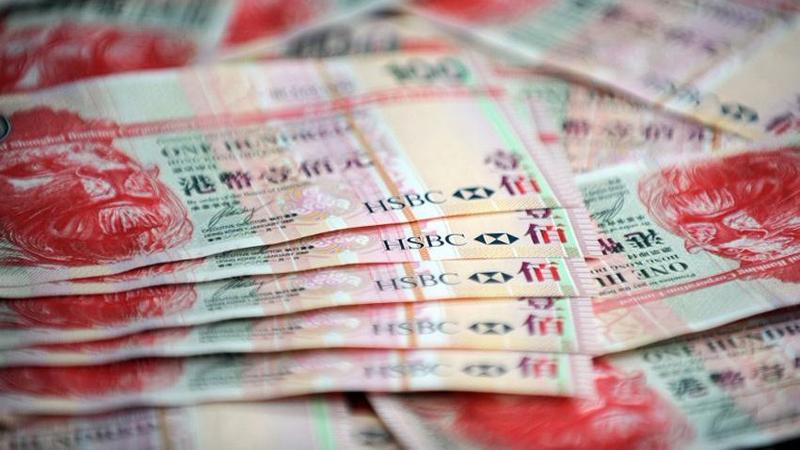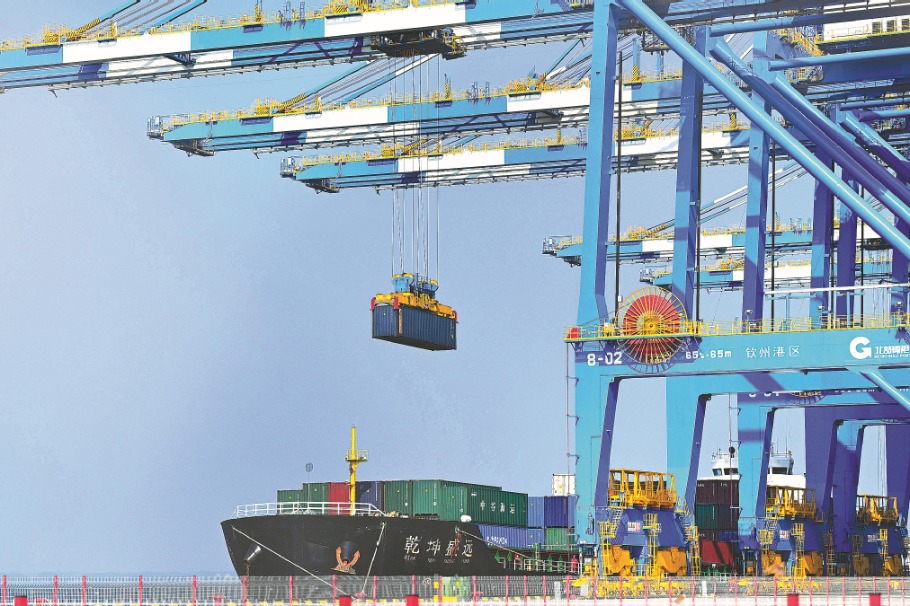Stress on digital assets as e-HKD date nears


The Hong Kong Monetary Authority selected 16 firms from the financial, payment and technology sectors in May to participate in the first round of a trial run for the local electronic currency, the e-HKD. The pilot program involves 14 projects in six categories of potential e-HKD use - full-fledged payments; programmable payments; offline payments; tokenized deposits; settlement of Web3 transactions; and tokenized-asset settlements.
The experiences drawn from these projects will be shared at the upcoming Hong Kong FinTech Week 2023, which is going to run from Oct 30 through Nov 5.
Note-issuing lender Hongkong and Shanghai Banking Corp will take part in two projects. It will collaborate with Hang Seng Bank and Visa to explore the feasibility of tokenized deposits, including digital settlement. HSBC will study the viability, key design considerations, and interoperability of commercial bank-backed deposit tokens.
The other project relates to full-fledged payments, with an e-HKD payment ecosystem to be tested at the Hong Kong University of Science and Technology. HSBC will develop a prototype of e-HKD and a corresponding wallet to allow hundreds of HKUST students and staff members to make real-life purchases from merchants at the campus with the digital currency. Three hypotheses will be tested - using the e-HKD to lower transaction costs for merchants; strengthening fraud prevention; and providing targeted spending offers and discounts. The first phase will take place on the HKUST campus in September, with more pilot programs to follow.
"These trial programs offer a tremendous opportunity for the industry to consider different use cases and design choices, and co-create new payment functionalities and infrastructures that could add value to society," says Bojan Obradovic, HSBC's Hong Kong chief digital officer. "The industry is very excited about the opportunity, but the central bank digital currency is still an evolving space," he tells China Daily.
Hang Seng Bank - an HSBC Holdings subsidiary - is the only bank chosen to join three pilot projects covering programmable payments in government grant disbursements, the merchant rewards program, as well as digital settlement of tokenized deposits in different scenarios.
Bank of China (Hong Kong) will take part in two projects relating to programmable payments in government grant disbursements and prepaid services.
The BOCHK's e-HKD prepaid consumption solution aims to lower the technical threshold and the additional resources required to realize prepaid consumption. This can strengthen protection of customer funds, and create prepaid consumption business models with the attributes of safe funds, convenient experience, as well as flexibility and openness.
The participating banks and enterprises can use the HKMA's e-HKD "sandbox" to examine implementation and design issues relating to the e-HKD and gain actual experience. The HKMA will liaise closely with the enterprises in conducting the pilot projects and monitoring their progress in the next few months.
"The platform can realize the standardized operation and management for merchants' funds, forming a firewall between customers' stored value funds and merchants' operating funds. Through transaction data information, banks can also grasp the business situation of merchants, assess the future operating income of merchants accurately, and provide timely operating funding support for merchants," explains Chen Guang, deputy general manager of BOCHK's digital-currency task force.
He tells China Daily that local financial regulators could integrate the e-HKD with other electronic payment tools to reduce the general costs required in utilizing new payment tools, and enjoy the fund stability advantage to unleash the digital currency's technical advantages.

Remaining concerns
Although the HKMA's e-HKD pilot program is in full gear now, the banking regulator has yet to decide when to introduce e-HKD in the special administrative region - or whether to introduce it at all.
Zou Chuanwei, chief economist at digital asset management company HashKey Group, says adopting the e-HKD will depend on whether Hong Kong will pass legislation to make e-HKD legal tender.
"It may take six months to a year to discuss whether it is necessary to amend existing laws or draft new legislation to provide the e-HKD with a legal basis," says Kenny Shui Chi-wai, vice-president and co-head of research at Our Hong Kong Foundation. "We hope the e-HKD can be used in Hong Kong in the next few years."
Norton Rose Fulbright partner Etelka Bogardi says: "Adopting the e-HKD would require significant technical, operational, policy, legal and regulatory work to be completed. The pilot programs should take into consideration real world applications across different segments according to industry verticals, such as credit-card companies, banks and e-wallet issuers."
Besides the legal changes and operational work required, one unique practical challenge is how to convince individuals and local businesses that the e-HKD is efficient and can serve the public well.
The HKMA has to address how implementing the e-HKD can enhance the domestic market and efficiency, as well as strengthen Hong Kong's status as a global financial center, says Mayer Brown partner Sara Or Sin-man. "This underscores the importance of the e-HKD's interoperability and convertibility with other payment systems in Hong Kong, with e-CNY or at the international level."
To begin with, the e-HKD can promote financial inclusiveness in Hong Kong, as the digital currency will facilitate accessing modern financial services, and help enterprises to manage funds in a smart and efficient way. While this would cut business operating costs, financial inclusiveness should not be the major objective as the city's degree of financial inclusiveness is already very high, with a sophisticated financial system and its deep market saturation, and a range of payment systems.
Hong Kong's e-HKD initiative should rather focus on developing a digital economy by developing digital payment systems, and lifting the city's status as an international financial center in digital assets, according to stakeholders in financial technology, business advisory, think tanks and global law firms.

Zou believes the e-HKD can hasten the development of a digital economy in Hong Kong through five ways.
"First, the digital currency is very safe as it is endorsed by the HKSAR government. It also offers high payment efficiency and low costs. The e-HKD is also versatile in being legal tender and interoperable. The intelligence of programmable payments and the offline payment function of the e-HKD also contribute to the digital economy's development."
Zou argues that the e-HKD can bolster the HKSAR's competitiveness in the global payment system by promoting the development of the digital economy, boosting the city's capabilities in payment technologies, strengthening market competition, and connecting cross-border payment and remittance among payment systems in different countries and regions.
Long-term perspectives
Shui calls for further steps to be taken, urging the financial regulatory authorities to study more-complex use cases, such as the payment of green bonds, silver bonds and health insurance claims that would further differentiate the e-HKD from the traditional currency and would increase its appeal to the public.
He says Hong Kong should study cross-border retail application of the central bank digital currency to promote financial activities between the Chinese mainland and the HKSAR in the long run.
Hong Kong's e-HKD initiative should also focus on cementing the city's fintech infrastructure competitiveness in tokenized assets.
"Using the e-HKD in the settlement of tokenized assets will help Hong Kong develop the issuance and trading of tokenized assets. This would be of great significance to Hong Kong in augmenting its status as a world financial center in digital assets," Zou says.
Stanley Sum Ka-ho, partner and Hong Kong head of digital enablement at KPMG China, agrees. "Tokenized asset settlement and tokenized deposits have major advantages over traditional settlement systems, such as accelerated settlement time, reduced settlement cost and greater transaction security," he says. "Having an exchange system with such features can improve Hong Kong's attractiveness to institutions worldwide, as the costs of setting up and running the business in the city are now reduced."

Bogardi adds: "Using the e-HKD for settlement of tokenized asset transactions is one of the most exciting elements in developing the digital currency. As asset tokenization is set to become a major market, it would put Hong Kong at the forefront in this nascent sector."
Shui says he believes that exploring tokenized asset settlement and tokenized deposits will enhance the SAR's status as a digital global financial center by broadening the scope of investable digital assets and smoothening rear-end settlements; and exploring the basic safekeeping function of financial institutions that form the cornerstone of the digital financial center.
The mainland is also piloting its CBDC - the e-CNY - for potential use. There have been calls to link up the e-HKD's development with that of the e-CNY, but stakeholders have divergent views.
Zou says he does not believe it is necessary for Hong Kong to bundle the decision of implementing the e-HKD with the e-CNY because the latter mainly serves the upgrading needs of the retail payment market on the mainland. Another reason is that the e-HKD will be pegged to the US dollar, which is not the case with the e-CNY.
But Shui begs to differ. Riding on potential future links between the two digital currencies, Hong Kong can try to connect its CBDC (e-HKD) with more economies worldwide and aim to develop itself as a regional or even a global CBDC hub.
"We believe that linking the e-HKD with the e-CNY would be a wise move as cross-border application of the CBDC will help promote capital flow in the Guangdong-Hong Kong-Macao Greater Bay Area and encourage cross-border financial activities between the mainland and Hong Kong. However, such a linkage would depend on technical feasibility, regulatory considerations and market demand," Shui says.
Bogardi says, "Linking the e-HKD with the e-CNY would most certainly have its advantages, particularly in relation to cross-border payments."
The HKMA will set up a CBDC experts group to invite leading academics from local universities to give their views on policy and technical issues concerning central bank digital currencies, such as privacy protection, cybersecurity and interoperability.
The city's banking regulator said in June 2021 it would study the possibility of issuing the e-HKD in Hong Kong as part of the "Fintech 2025" strategy. After two rounds of public consultations, it decided in September 2022 that implementing the e-HKD would be carried out in a three-rail approach, with Rail 2 focusing on application research and pilot programs.























